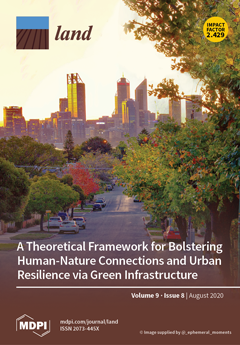Most policies designed to reduce land fragmentation involve land consolidation. However, research examining the relationship between agricultural zoning and land fragmentation has not yet been explored. This paper considers the causal impact of an anti-land fragmentation policy on farmland use…
In 2000, to efficiently implement land-use policies, the Taiwanese government amended the Agricultural Development Act by easing restrictions on agricultural land purchases. As a result of increasing land development and investment needs, agricultural land prices have surged. This study aims to…
In the face of rapid urbanization and globalization, the continual loss of rural landscapes is occurring globally because of declining rural industries, abandoned farmlands and aging local populations. These problems highlight the versatility and diverse values of cultural ecosystem services (…
This study compiles the latest regional topographic data from field investigation and remote-sensing images to recalculate parameters of the universal soil loss equation (USLE) model of the Shenmu watershed; also to compensate for reduced accuracy of this model on small-scale slopes, this study…
This paper reviews the constraints and challenges of paddy farming in Taiwan. Based on those evidences, a set of eco-friendly rice farming practices raised by SRI principles are proposed from exploratory SRI trials conducted in Taiwan. The trials show that even with less exact leveling in the…
Tainan, located in southwestern Taiwan, is a high-risk region for flooding and climate change effect and has a potential for future heavy rains. Groundwater pumping for aquaculture and irrigation along the coastal plain of Tainan is monitored due to subsidence. Predicting future subsidence and…
Subsidence in Yunlin County, Taiwan, is serious and continuous. The Taiwan High Speed Rail (THSR) route crosses the subsidence area and might be affected by differential settlements. It is important to evaluate the pumping quantity for water resource management and to predict the subsidence for…
This Law is enacted for the purposes of protecting the fundamental rights of indigenous peoples, promoting their subsistence and development and building inter-ethnic relations based on co-existence and prosperity.
Two-thirds of the total area of Taiwan is mountainous terrain, which is the main groundwater recharge source of the plains region. This study assesses groundwater recharge and exploitative potential zone in the central division of the mountain areas of Taiwan (the middle reaches of the Jhuoshuei…
Incineration is considered as an efficient approach in dealing with the increasing demand for municipal and industrial solid waste treatment, especially in areas without sufficient land resources. Facing the concern of health risk, the toxic pollutants emitted from incinerators have attracted…
Reservoir management faces a wide range of new challenges resulting from the impact of climate change. One set of challenges arises from the non-stationary nature of hydrological conditions. Another crucial issue is watershed sedimentation, which can significantly influence the sustainability…
This study aims to clarify the features of community plans based on the 'Rural Rejuvenation Act'(RRA), choosing Miaoli county of Taiwan as a case study area. We scrutinized planning documents made by national and county government and conducted interview to government officials who…




